29 Selenium-Rich Foods: Powerful Antioxidants That Fight Cancer
Discover the power of selenium, a vital mineral essential for optimal health.
From boosting immunity to supporting thyroid function, selenium plays a crucial role in our bodies.
This comprehensive guide explores 29 delicious and nutritious selenium-rich foods, helping you make informed choices for a balanced diet.
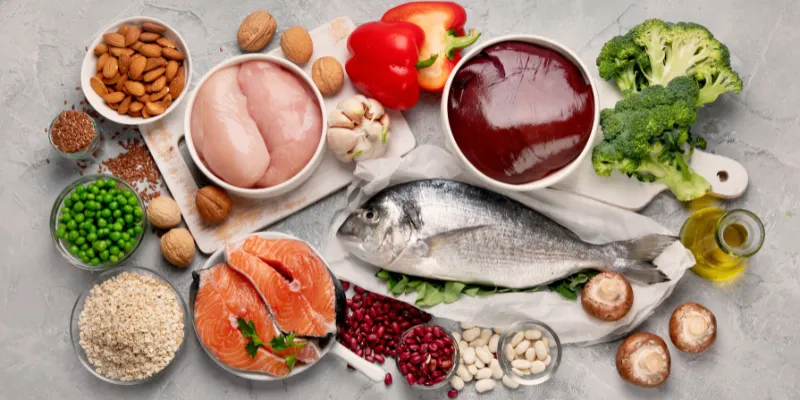

Seafood
Tuna
Tuna is an excellent source of selenium and offers numerous health benefits. This lean protein is rich in omega-3 fatty acids, which support heart health and reduce inflammation.
Canned light tuna is a convenient and affordable option, while fresh tuna steaks provide a more luxurious dining experience.
| Nutrient | Amount per 100g |
|---|---|
| Selenium | 36.5 μg |
| Protein | 23.4 g |
| Omega-3 | 1.2 g |
Halibut

Halibut is a flatfish known for its mild flavor and firm texture. It’s an excellent source of selenium and provides high-quality protein.
This versatile fish can be grilled, baked, or pan-seared, making it a popular choice for health-conscious individuals.
| Nutrient | Amount per 100g |
|---|---|
| Selenium | 47.5 μg |
| Protein | 22.5 g |
| Vitamin D | 4.7 μg |
Sardines
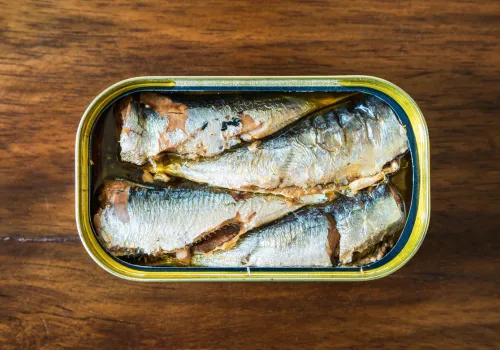
Sardines are small, oily fish packed with nutrients. They’re an excellent source of selenium, omega-3 fatty acids, and calcium (when consumed with bones).
These affordable fish can be eaten straight from the can or used in various recipes, from salads to pasta dishes.
| Nutrient | Amount per 100g |
|---|---|
| Selenium | 52.7 μg |
| Omega-3 | 1.5 g |
| Calcium | 382 mg |
Salmon
Salmon is renowned for its high omega-3 content and is also an excellent source of selenium.
This fatty fish offers numerous health benefits, including improved brain function and reduced inflammation.
Whether wild-caught or farmed, salmon can be prepared in countless ways, from grilling to smoking.
| Nutrient | Amount per 100g |
|---|---|
| Selenium | 41.4 μg |
| Omega-3 | 2.3 g |
| Protein | 22.1 g |
Shrimp

Shrimp are low in calories but high in protein and selenium. These crustaceans are versatile and can be used in a wide range of dishes, from stir-fries to salads.
When purchasing shrimp, opt for wild-caught varieties when possible, as they tend to have a better nutritional profile.
| Nutrient | Amount per 100g |
|---|---|
| Selenium | 54.0 μg |
| Protein | 20.3 g |
| Vitamin B12 | 1.9 μg |
Cod
Cod is a white fish known for its mild flavor and flaky texture. It’s an excellent source of selenium and provides high-quality protein with very little fat.
This versatile fish can be baked, grilled, or used in traditional dishes like fish and chips (though healthier cooking methods are recommended).
| Nutrient | Amount per 100g |
|---|---|
| Selenium | 33.1 μg |
| Protein | 17.8 g |
| Vitamin B6 | 0.3 mg |
Mackerel

Mackerel is an oily fish rich in selenium, omega-3 fatty acids, and vitamin D. This nutrient-dense fish offers a range of health benefits, including improved heart health and stronger bones.
Mackerel can be grilled, smoked, or canned, providing various options for incorporating it into your diet.
| Nutrient | Amount per 100g |
|---|---|
| Selenium | 44.1 μg |
| Omega-3 | 2.7 g |
| Vitamin D | 16.1 μg |
Poultry and Eggs
Chicken
Chicken is a popular source of lean protein and selenium. This versatile poultry can be prepared in countless ways, making it a staple in many cuisines worldwide.
Opt for free-range or organic chicken when possible, as these may have a better nutritional profile.
| Nutrient | Amount per 100g |
|---|---|
| Selenium | 22.0 μg |
| Protein | 31.0 g |
| Niacin | 13.7 mg |
Turkey
Turkey is another excellent source of selenium and lean protein. This poultry is often associated with holiday meals but can be enjoyed year-round in various forms, from deli meat to ground turkey.
Turkey is also rich in tryptophan, an amino acid that may help promote better sleep.
| Nutrient | Amount per 100g |
|---|---|
| Selenium | 32.2 μg |
| Protein | 29.1 g |
| Vitamin B6 | 0.7 mg |
Duck

Duck meat is rich in selenium and offers a more indulgent flavor compared to chicken or turkey. It’s a good source of iron and provides beneficial fatty acids.
While duck is higher in fat than other poultry, much of it is healthy monounsaturated fat.
| Nutrient | Amount per 100g |
|---|---|
| Selenium | 13.9 μg |
| Protein | 19.3 g |
| Iron | 2.5 mg |
Eggs
Eggs are a nutritional powerhouse, providing high-quality protein, selenium, and various vitamins and minerals.
They’re versatile and can be prepared in numerous ways, from boiled to scrambled.
The selenium in eggs is found primarily in the yolk, so consuming whole eggs is recommended for maximum nutritional benefit.
| Nutrient | Amount per 100g |
|---|---|
| Selenium | 30.7 μg |
| Protein | 12.6 g |
| Vitamin D | 2.0 μg |
Nuts and Seeds
Brazil Nuts
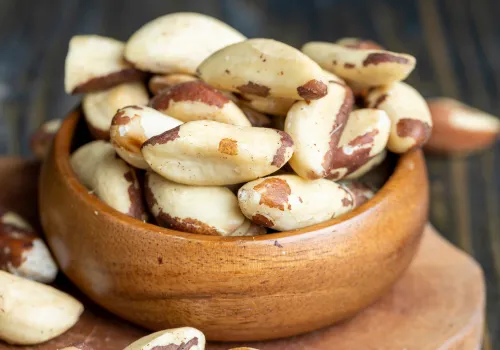
Brazil nuts are the richest known food source of selenium. Just one ounce (6-8 nuts) can provide more than the daily recommended intake of selenium.
These large, creamy nuts are delicious on their own or can be used in baking and cooking. However, due to their high selenium content, it’s important not to overconsume them.
| Nutrient | Amount per 100g |
|---|---|
| Selenium | 1917 μg |
| Protein | 14.3 g |
| Magnesium | 376 mg |
Sunflower Seeds
Sunflower seeds are a great source of selenium, vitamin E, and healthy fats. These small seeds pack a nutritional punch and can be easily incorporated into various dishes.
Sprinkle them on salads, add them to baked goods, or enjoy them as a healthy snack.
| Nutrient | Amount per 100g |
|---|---|
| Selenium | 53.0 μg |
| Vitamin E | 35.2 mg |
| Magnesium | 325 mg |
Chia Seeds
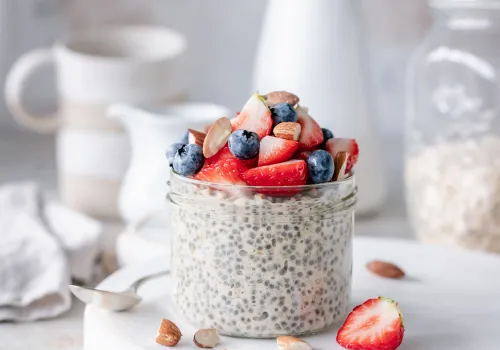
Chia seeds are tiny nutritional powerhouses, offering selenium, omega-3 fatty acids, and fiber. These seeds can absorb water and form a gel-like consistency, making them useful in cooking and baking.
Add chia seeds to smoothies, yogurt, or use them as an egg substitute in vegan recipes.
| Nutrient | Amount per 100g |
|---|---|
| Selenium | 55.2 μg |
| Fiber | 34.4 g |
| Calcium | 631 mg |
Flaxseeds
Flaxseeds are rich in selenium, omega-3 fatty acids, and lignans (plant compounds with antioxidant properties).
These small seeds have a nutty flavor and can be ground to increase nutrient absorption.
Incorporate ground flaxseeds into smoothies, baked goods, or sprinkle them on yogurt or oatmeal.
| Nutrient | Amount per 100g |
|---|---|
| Selenium | 25.4 μg |
| Omega-3 | 22.8 g |
| Fiber | 27.3 g |
Cashews
Cashews are creamy, delicious nuts that provide selenium, along with heart-healthy monounsaturated fats and essential minerals.
These versatile nuts can be enjoyed as a snack or used in both sweet and savory dishes.
Cashew butter is a popular alternative to peanut butter and can be used in similar ways.
| Nutrient | Amount per 100g |
|---|---|
| Selenium | 19.9 μg |
| Protein | 18.2 g |
| Iron | 6.7 mg |
Grains
Brown Rice
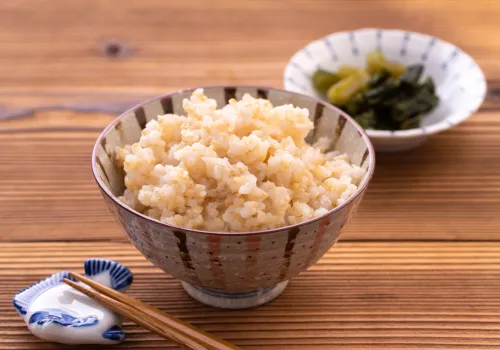
Brown rice is a whole grain that provides selenium along with fiber and other essential nutrients. It has a nuttier flavor and chewier texture compared to white rice.
This versatile grain can be used as a base for stir-fries, salads, or as a side dish for various meals.
| Nutrient | Amount per 100g |
|---|---|
| Selenium | 23.4 μg |
| Fiber | 3.5 g |
| Magnesium | 143 mg |
Oatmeal
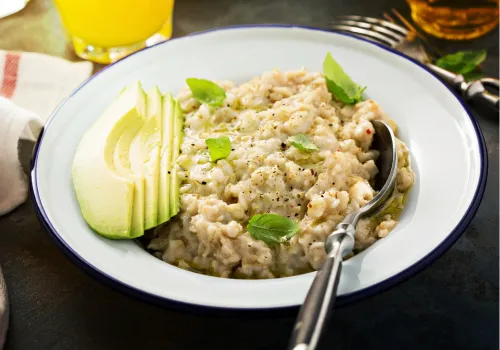
Oatmeal is a nutritious breakfast option that provides selenium, along with fiber and beta-glucans (a type of soluble fiber). This hearty grain can help lower cholesterol and improve gut health.
Enjoy oatmeal with fresh fruits, nuts, or a drizzle of honey for a delicious and nutritious start to your day.
| Nutrient | Amount per 100g |
|---|---|
| Selenium | 34.4 μg |
| Fiber | 10.6 g |
| Iron | 4.7 mg |
Whole Wheat Bread
Whole wheat bread is a good source of selenium and provides more nutrients than refined white bread.
It offers fiber, B vitamins, and various minerals essential for overall health.
Choose 100% whole wheat bread for maximum nutritional benefits, and use it for sandwiches or as a side with soups and salads.
| Nutrient | Amount per 100g |
|---|---|
| Selenium | 27.8 μg |
| Fiber | 6.8 g |
| Protein | 13.2 g |
Barley
Barley is an ancient grain rich in selenium, fiber, and beta-glucans. This versatile grain has a chewy texture and nutty flavor, making it a great addition to various dishes.
Use barley in soups, stews, salads, or as a rice alternative for a nutritious boost to your meals.
| Nutrient | Amount per 100g |
|---|---|
| Selenium | 37.7 μg |
| Fiber | 15.6 g |
| Protein | 12.5 g |
Dairy
Cottage Cheese
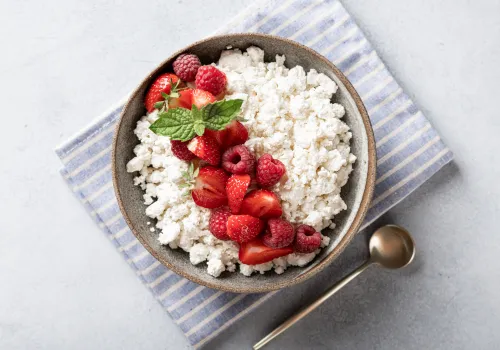
Cottage cheese is a fresh, mild-flavored cheese that’s high in selenium and protein. This versatile dairy product is low in calories and fat, making it a popular choice for those watching their weight.
Enjoy cottage cheese on its own, with fruits, or use it in both sweet and savory recipes.
| Nutrient | Amount per 100g |
|---|---|
| Selenium | 11.0 μg |
| Protein | 11.1 g |
| Calcium | 83 mg |
Yogurt
Yogurt is a probiotic-rich food that also provides selenium. This fermented dairy product offers numerous health benefits, including improved digestion and stronger immunity.
Choose plain, unsweetened yogurt and add your own fruits or honey for a healthier option. Greek yogurt is particularly high in protein.
| Nutrient | Amount per 100g |
|---|---|
| Selenium | 2.0 μg |
| Protein | 3.5 g |
| Calcium | 121 mg |
Milk
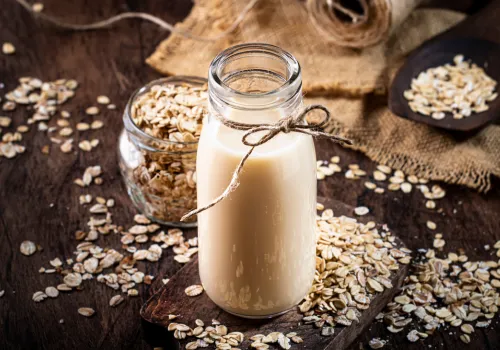
Milk is a good source of selenium and provides a range of other essential nutrients, including calcium and vitamin D. This versatile drink can be consumed on its own or used in various recipes.
For those who are lactose intolerant or following a plant-based diet, fortified plant milks can be a good alternative.
| Nutrient | Amount per 100g |
|---|---|
| Selenium | 3.7 μg |
| Protein | 3.3 g |
| Calcium | 113 mg |
Legumes
Lentils
Lentils are nutrient-dense legumes that provide selenium, along with protein, fiber, and various minerals.
These versatile pulses come in different colors and can be used in a wide range of dishes.
Add lentils to soups, stews, salads, or use them as a meat substitute in vegetarian recipes.
| Nutrient | Amount per 100g |
|---|---|
| Selenium | 2.8 μg |
| Protein | 9.0 g |
| Fiber | 7.9 g |
Navy Beans
Navy beans, also known as haricot beans, are small white beans rich in selenium and fiber. These mild-flavored beans are a staple in many cuisines and offer numerous health benefits.
Use navy beans in soups, stews, chili, or mash them to make a creamy dip or spread.
| Nutrient | Amount per 100g |
|---|---|
| Selenium | 3.6 μg |
| Protein | 8.2 g |
| Fiber | 10.5 g |
Chickpeas
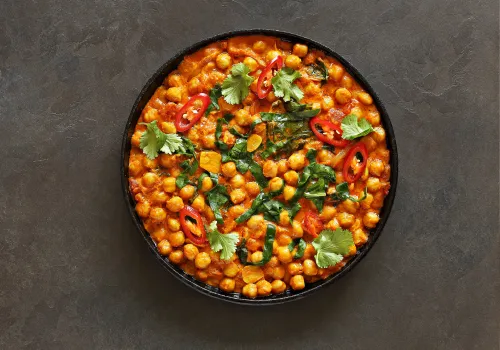
Chickpeas, also known as garbanzo beans, are a good source of selenium and offer a range of other nutrients. These versatile legumes have a nutty flavor and creamy texture.
Use chickpeas in salads, soups, or blend them to make hummus. They can also be roasted for a crunchy, nutritious snack.
| Nutrient | Amount per 100g |
|---|---|
| Selenium | 3.0 μg |
| Protein | 8.9 g |
| Fiber | 7.6 g |
Vegetables
Spinach
Spinach is a nutrient-packed leafy green that provides selenium along with various vitamins and minerals. This versatile vegetable can be eaten raw or cooked and offers numerous health benefits.
Add spinach to salads, smoothies, or sauté it as a side dish for a nutritious boost to your meals.
| Nutrient | Amount per 100g |
|---|---|
| Selenium | 1.0 μg |
| Vitamin A | 469 μg |
| Iron | 2.7 mg |
Broccoli
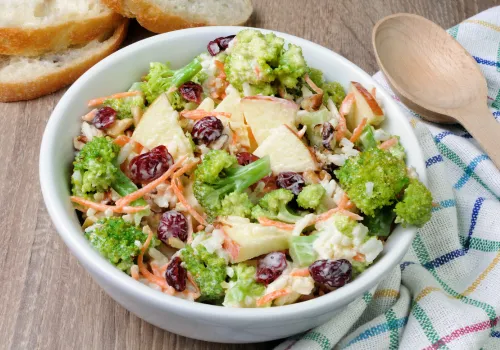
Broccoli is a cruciferous vegetable that offers selenium along with vitamin C, fiber, and various antioxidants.
This nutritious vegetable has been linked to numerous health benefits, including improved heart health and reduced cancer risk.
Enjoy broccoli steamed, roasted, or added to stir-fries for a nutrient boost.
| Nutrient | Amount per 100g |
|---|---|
| Selenium | 2.5 μg |
| Vitamin C | 89.2 mg |
| Fiber | 2.6 g |
Mushrooms
Mushrooms are fungi that provide selenium and offer a range of other health benefits.
Different varieties of mushrooms have varying nutrient profiles, but all can contribute to a healthy diet.
Add mushrooms to salads, soups, or sauté them as a side dish. They can also be used as a meat substitute in vegetarian dishes due to their umami flavor and meaty texture.
| Nutrient | Amount per 100g |
|---|---|
| Selenium | 12.3 μg |
| Vitamin D | 0.7 μg |
| Potassium | 318 mg |
Final Thoughts
Incorporating these selenium-rich foods into your diet can significantly boost your intake of this essential mineral.
From seafood to nuts, grains to vegetables, there’s a wide variety of delicious options to choose from.
Remember, a balanced diet with diverse food choices is key to optimal health and nutrition.